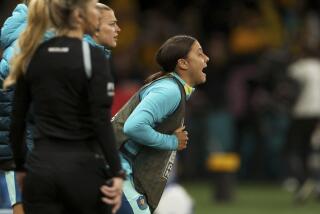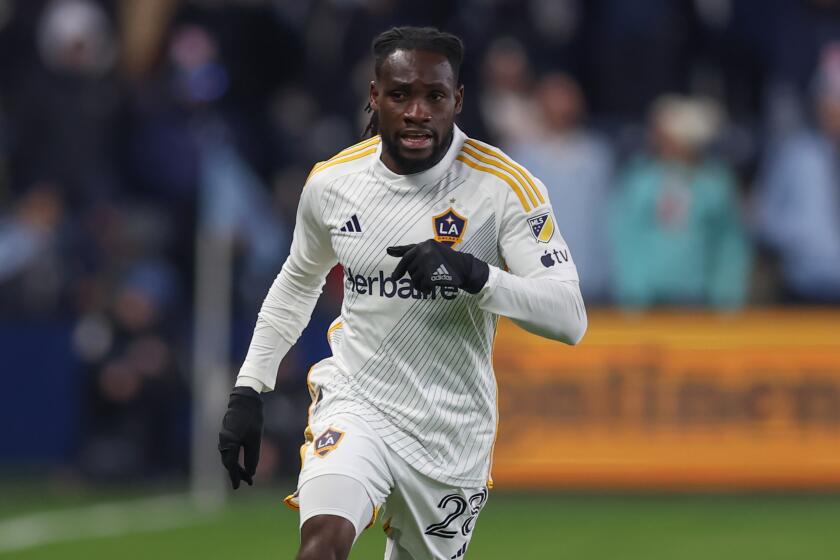Landon Donovan: Goal oriented
I’ve read that some people call Landon Donovan the Kobe Bryant of soccer; I wonder if the day will come when people call Bryant the Landon Donovan of basketball?
Arguably the best player that soccer-lukewarm America has ever produced has taken his world-class game from casual kids’ matches in the backyards of Redlands, to the massive professional arenas of Europe, and back to Southern California, to the L.A. Galaxy in Carson. Come June, Donovan is expected to anchor the U.S. team in the World Cup.
You’ve heard of it? Happens every four years? The world comes to a standstill, and Americans tend to change the channel, which is a little like tuning out both the Olympics and the Nobel Prizes.
In the meantime, the thoroughly globalized Donovan proves that although you can take the player out of California, you can’t take the California out of . . . well, you know.
Your father played semi-pro ice hockey.
I spent many weekends with my dad watching hockey on TV, and my dad and I talk about this all the time -- about how similar the two sports are, the way you move and the way things happen in hockey.
There wasn’t a lot of professional soccer here when you grew up.
There was none. We never had cable TV, we never saw soccer games from around the world; we just loved going outside and playing. That was all I knew about soccer: going outside and playing with my friends.
I wonder why so many soccer teams have singular names -- like the Galaxy, or Manchester United -- but other sports team names here are plural: the Dodgers, the Packers, the Kings.
That’s interesting. I think we’re more into mascots here. Around the world, a lot of times it’s just the city [name] -- Barcelona or Madrid or Milan.
What’s the difference between playing here and in Europe?
The media coverage and the fans. We have fans that are as hard core as the fans in Europe; we just don’t have the numbers. There might be a thousand Galaxy fans that are hard core; at Everton [in England] this year, there were 30,000. Then the media there put so much pressure on the players; you’re under the spotlight. It’s a blessing in disguise here. We talk about how we want [U.S. soccer] to be bigger, but the other side is everyone’s into your business all the time , so it’s not always a nice thing.
As an American player, are you treated differently abroad?
It used to be that way. When I was 17, I went to Germany. They wouldn’t come out and say it blatantly, but the way they treated you on the field -- they wouldn’t pass you the ball sometimes. It’s almost like they didn’t trust you. Nowadays, a lot of hard work by a lot of different players has helped to change that perception.
Do you say “football” there?
When I went to England this year, during an interview, I said “soccer” three or four times. I realized how stupid that sounded to these people, who invented the sport and have been saying “football” for over 100 years, and I was saying soccer this and soccer that. So I am cognizant of it when I’m in other parts of the world. When I’m in Latin [America], I’ll say futbol. Maybe it doesn’t really matter, but it’s respectful.
You speak Spanish -- does that help?
I could never have imagined how much it was going to help me. Growing up, it was literally a means of being able to play with a lot of the kids, so I had to learn Spanish.
The U.S. beat Canada at ice hockey during the Vancouver Olympics, and I felt bad. We don’t care much about ice hockey, and they love it. How would it feel for Americans to win the World Cup when it’s the rest of the world that’s so passionate about it?
That’s almost the perfect analogy. We don’t have it in our blood like they do in other countries. It’s certainly going to be a while before we’re seriously competing for a World Cup. Only seven or eight teams have ever won -- Brazil five times, a few other teams just once -- so it’s not the easiest thing to win. The World Cup is so massive, you’d have to be living under a rock not to pay attention this summer. Every four years we have our big opportunity to gain some fans, and we take that very seriously.
Your little-kid fans must have grown up with soccer.
It’s not only little kids. You see kids in their teenage years who’ve been watching since they were little, and that’s where you build the real fan base.
Girls too?
In other parts of the world, to be honest, it’s mainly males, but in our country, it’s got to be closer to 50-50.
Did you have to perfect your autograph?
It kind of evolved. A lot of people just scribble their first initial, then kids get home and go, “What is this?”
Do you learn anything from fan criticism?
Unless you’ve played the game as a professional, it’s really hard to understand what’s going on. I catch myself doing it when I’m watching other sports, to say, “How could you do that?” What we do is judged on sometimes seconds at a time; if you misspell a word, you have time to correct it. We don’t have time to do that; it’s done, you’re judged on it.
You’ve described yourself as a kind of Buddhist.
The way I see life is [that] nothing that happens to me should really affect me if I’m OK with who I am. You asked me, “Does criticism get to you?” When I was younger, it did, because I had a lot of insecurities. I try to live my life in a pretty simple way and look at myself honestly, and if you do that, you don’t have to worry about what anybody else is saying. I’ve had some interesting experiences in my life that I’ve been able to learn from. I’m very grateful for that. The ones I’ve grown from the most are the ones that weren’t good.
There was so much publicity from a book called “The Beckham Experiment,” in which you criticized David Beckham as disengaged from the Galaxy.
That is, I would say, water under the bridge -- definitely for me, and I think David would say the same. I was telling you how not all of my experiences have been good. [This] taught me the importance of communicating. Most of my life, I’ve held things in when they bothered me. I spoke out to the wrong person [the book’s author], and it caused me a lot of anxiety and stress that would have been unnecessary if I had just approached David and told him how I felt.
Some people said your comments lit a fire under Beckham and he ended up doing better by the team and himself.
I don’t tend to believe that. David Beckham has played at some of the biggest clubs in the world, so I don’t think he needs motivation. David was probably a little unprepared for what was going to happen when he got here. He came to a team that was in very poor shape, organizationally and on the field, and he’s not used to that, and from that standpoint I have a lot of compassion for what he had to go through. But to his credit he is now completely committed to this team and you can tell he really enjoys being here. Soccer is his life, and I think he’s always happiest when he’s either on the field or with his family, and when you take the field part away, it’s got to be difficult. That’s who he is, so I think he’s quite desperate to get back.
Are you two like Jerry Rice and Steve Young, working in sync?
Jerry Rice and Steve Young probably had to spend five years perfecting what they did. David and I see the game exactly the same way. It’s like a match made in heaven. When he gets the ball, I know where he wants me to be, and my body language will tell him where I want the ball played. When we make eye contact, we know exactly what’s going to happen next. When you have that, you’re obviously a step ahead of your opponent.
As the highest-paid American player ever, have you broken into seven figures?
I have. I am very proud of that. I’m also grateful because for a long time, players wouldn’t play in America because they could make so much money in Europe. Now we’re getting to a point where we can compete financially. You’re not going to lure top players if you can’t pay them. We just signed a new collective bargaining agreement, and the minimum will be $40,000, which isn’t by any means extravagant money but at least you can make some sort of living on that.
Do you have a favorite sports movie?
Do you remember “Field of Dreams”? It’s a little cheesy, but there’s a lot in it that resonates with me. It’s all about playing. There’s a [doctor character] who in his entire career played one game, in the outfield, one inning, but never got to bat. [In the film] he got his one at-bat -- and Kevin Costner’s girl starts choking on a hot dog. In that moment, he has a choice: If he leaves the field he can never go back [to the game]. And he puts his dreams aside and goes off the field and saves the girl. It’s really sweet.
I’m dying to ask about your dogs.
I have four, a Boston terrier we [bought] and three rescues. My ex-wife and I split time with them. I think we can learn a lot from dogs. They’re not worried about what you did yesterday; they’re not worried about what’s going in 10 minutes. They’re just worried about what’s going on now. It’s kind of inspiring.
This interview was edited and excerpted from a longer taped transcript.







